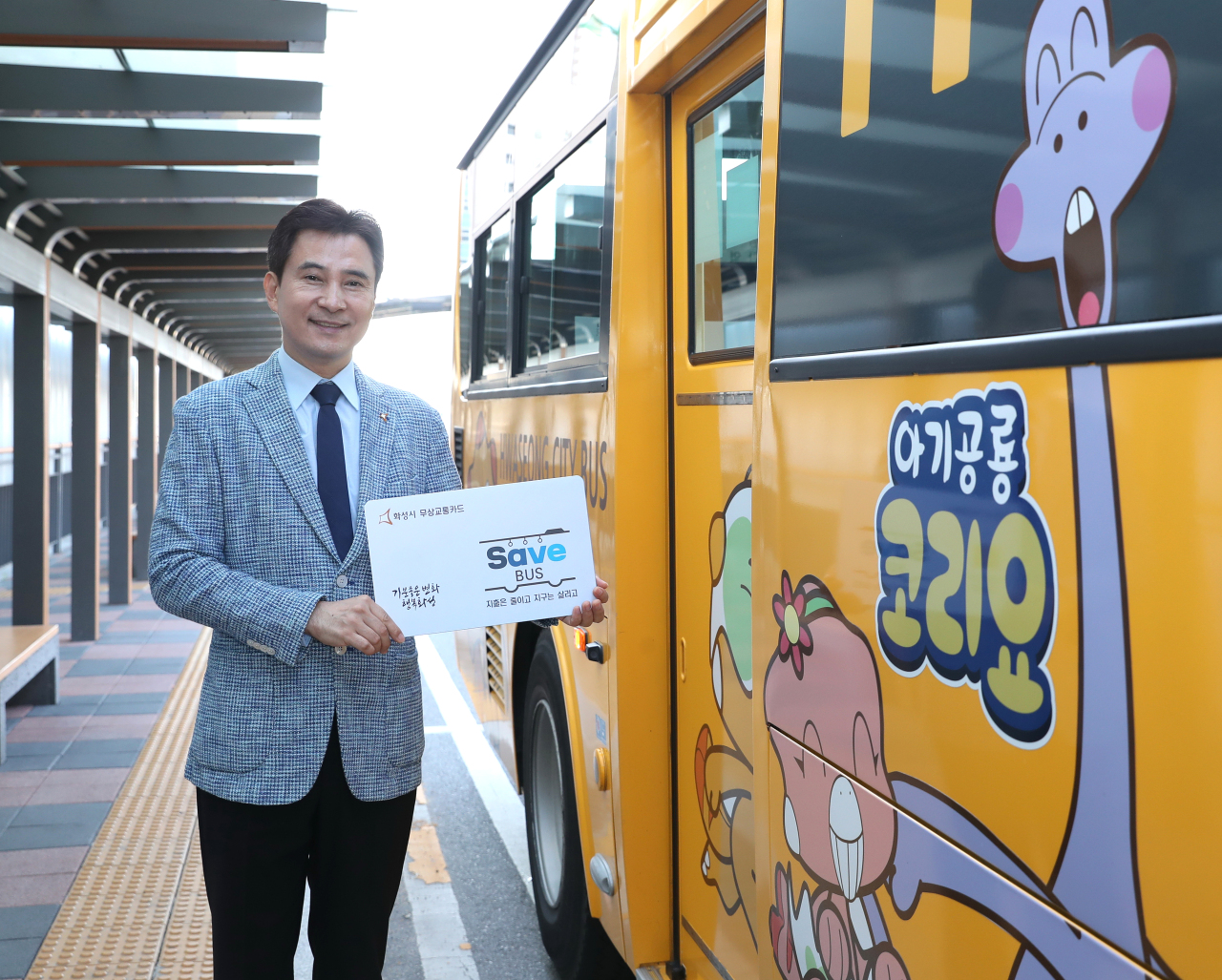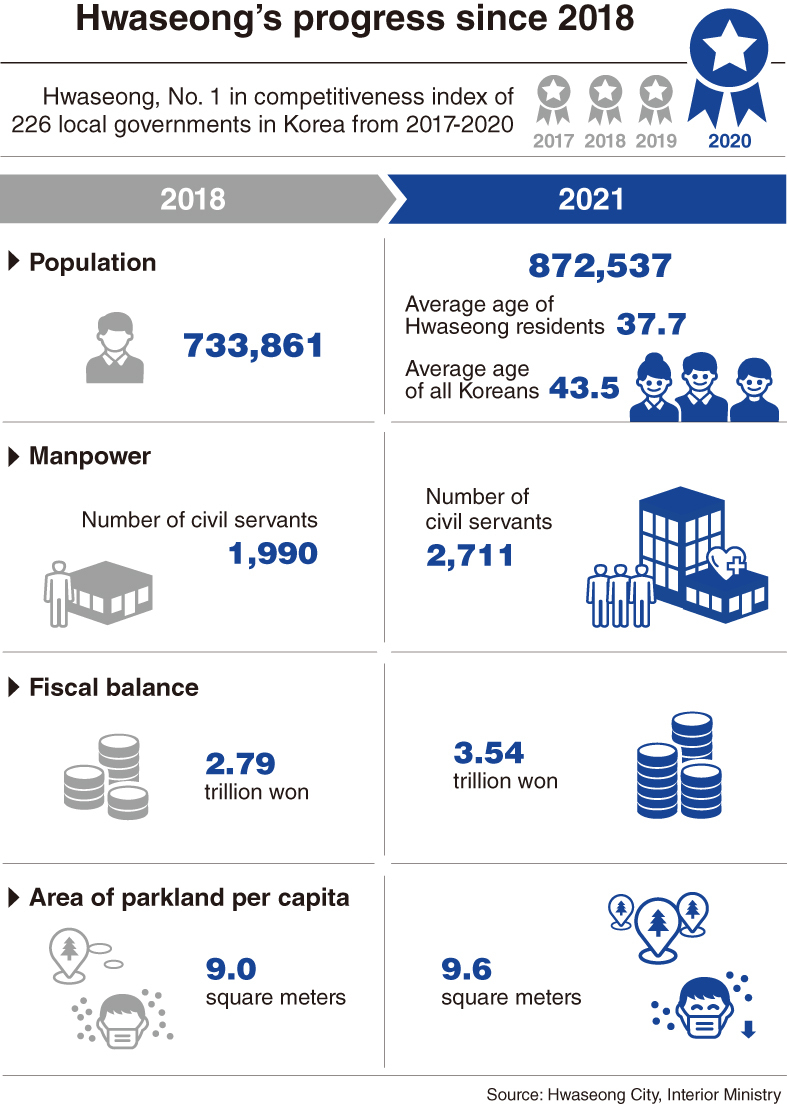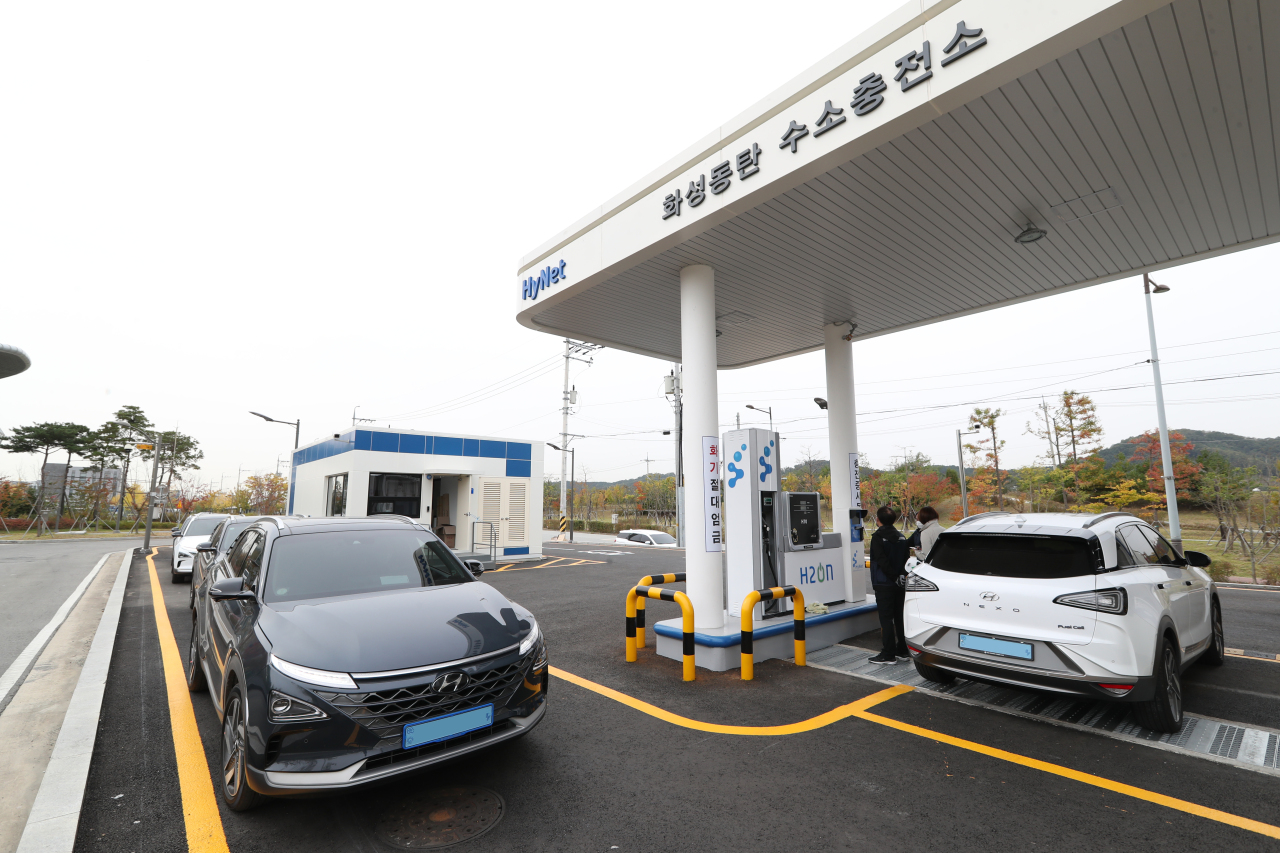 |
Hwaseong Mayor Seo Cheol-mo poses with a free-of-charge city bus, which has been in operation since 2020. (Hwaseong City) |
The rapid growth and innovations in Hwaseong, Gyeonggi Province is drawing attention to the city, and to its Mayor Seo Cheol-mo, who took office in July 2018.
Born to a needy family in 1968, Seo spent his childhood in a tiny, underground single-room apartment with nine other family members including his parents.
Though Seo had excellent academic scores, he had to give up on prominent private universities, and opted for the Republic of Korea Air Force Academy, which offered him full scholarship.
He experienced the democratization of South Korea in late 1980s -- when the military-based regime collapsed -- while serving in the military. This eventually prompted him to leave the military, and to choose to become a liberal party politician. In 2018, Seo became one of the first politicians with military background to be democratically elected as the head of a local government.
Though he was born in South Chungcheong Province’s Seosan, his stewardship of Hwaseong in Gyeonggi Province as an “outsider” has drawn attention, prompting some neighboring cities to benchmark the administrative performance of Hwaseong.
 |
(Graphic by Han Chang-duck/The Korea Herald) |
A core performance is the free-of-charge transportation system for teenagers and seniors, which is the first of its kind in the greater Seoul area -- Seoul, Gyeonggi Province and Incheon.
Under the program, those aged under 19 and seniors aged 65 or over have been allowed to use city or town buses without paying since November 2020. The program is set to be expanded in October to include those aged 19 to 23. The city reimburses the fares into the bank accounts of bus passengers each month or quarter.
The free bus service adopted by Hwaseong is also considered a benchmark by nearby local governments, presenting a new paradigm for public transportation.
Hwaseong City is pinning hopes that the policy will contribute to reducing greenhouse gas emissions by curbing citizens’ usage of automobiles as well as providing residents with convenience and social welfare.
The policy is dubbed “Hwaseong-type Green New Deal,” in which the city is seeking to build a cornerstone for sustainable city, in line with the central government’s efforts to achieve the carbon neutrality by 2050.
 |
A hydrogen fueling station in Dongtan-dong, Hwaseong, Gyeonggi Province (Hwaseong City) |
The mayor has also resolved conflict among local governments of Hwaseong, Ansan, Anyang, Bucheon, Gwangmyeong and Siheung -- by allowing facilities in Hwaseong that NIMBYism prevented in neighboring areas.
For example, Mount Hambaek Memorial Park, which is a funeral parlor and crematorium, opened this year. It was created by pooling about 170 billion won ($148 million) of funding from the six cities. This is expected to lead to joint development of the park with neighboring cities in the western part of the country.
Seo dealt with residents’ negative sentiment toward the project by promising financial support and job opportunities in the districts where the facilities are located.
The city paid the districts 10 billion won each for regional development projects, and continues to pay them 5-10 percent of profits from the cremation business. Residents in the towns will also be given priority in city-initiated employment.
Seo said that “Hwaseong outstrips the others in area scale. But (irrespective of the area comparison) we also had the ambition to make it a model case in the Seoul-Gyeonggi area, and in Korea.”
Hwaseong is larger than Seoul or Daejeon in terms of area, and the nearby five cities -- Ansan, Anyang, Bucheon, Gwangmyeong and Siheung.
In 2017, Hwaseong citizens voiced objections to the “arbitrary” decision of the Defense Ministry and Suwon City to relocate Suwon Military Airport -- which serves both Suwon and Hwaseong -- to Hwaseong’s Hwaong district.
Seo, after being elected mayor in 2018, made clear that the airport relocation project was improperly handled from the beginning, pointing out that the decision was made unilaterally without garnering agreement from Hwaseong City and Hwaseong citizens.
Seo, as a former air force officer, empathizes with agony of residents in Maehyang-ri in the city, who suffered noise and other side effects from bombardment drills of the US Air Force for five decades. He claims that the relocation issue should be discussed again from the starting point.
To improve the competitiveness of Hwaseong, he has pushed to foster the characteristics of each district for the goal of overall harmony and development of the city, in which each district continuously evolves.
Initiated by the mayor, the city is supporting volunteer work, generating synergy effects in its municipal administration.
Seo, before taking office as mayor, also had worked as a non-standing executive director at the Hwaseong Voluntary Works Center.
Seo has made full-fledged efforts to attain true local autonomy via communication and participation since his inauguration in 2018. He has also created civic communication platforms where citizens can directly explore pending regional issues and propose policies, such as the introduction of the Youth Regional Conference, Hwaseong Citizens’ Regional Conference, and Online Citizens’ Policy Advisory Group.
Hwaseong City ranked No. 1 in a state research agency’s assessment of local governments across the nation in its 2018 regional competitiveness index.
In the same year, the city also received a high score in the Employment Ministry’s assessment of cooperation among labor, employers and residents.
Seo is preparing for reelection in the coming 2022 local elections for completion of carrying out his past electoral pledges for Hwaseong residents. He has dismissed the rumors that he would run for the next parliamentary election.
By Kim Yon-se and Park Joung-kyu (
kys@heraldcorp.com)







![[Exclusive] Hyundai Mobis eyes closer ties with BYD](http://res.heraldm.com/phpwas/restmb_idxmake.php?idx=644&simg=/content/image/2024/11/25/20241125050044_0.jpg)
![[Herald Review] 'Gangnam B-Side' combines social realism with masterful suspense, performance](http://res.heraldm.com/phpwas/restmb_idxmake.php?idx=644&simg=/content/image/2024/11/25/20241125050072_0.jpg)

